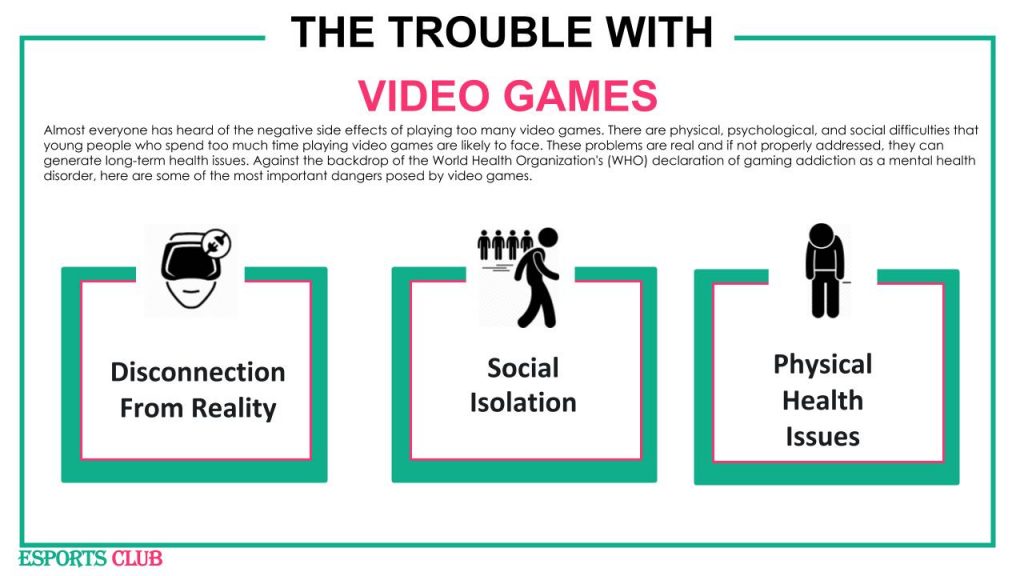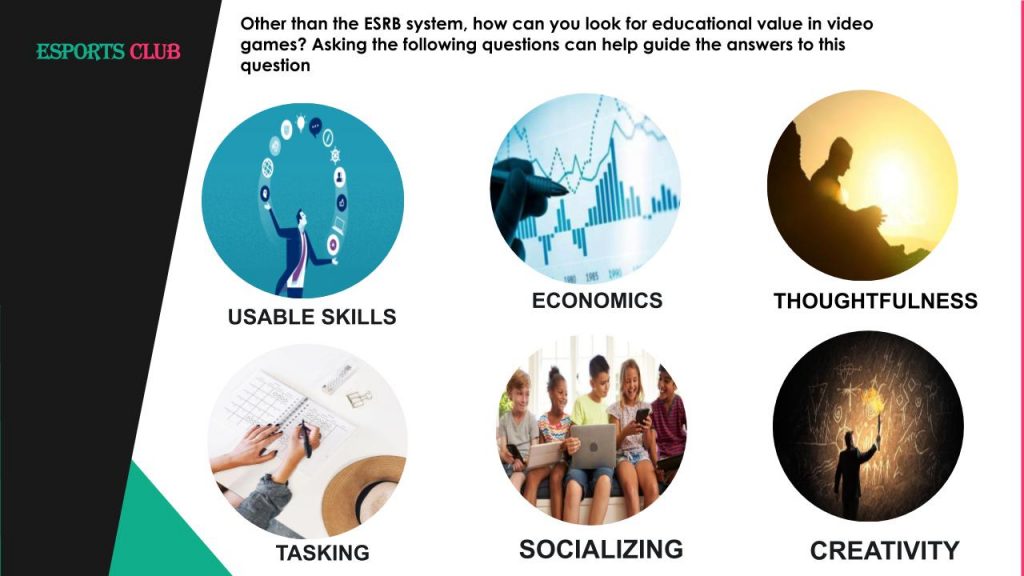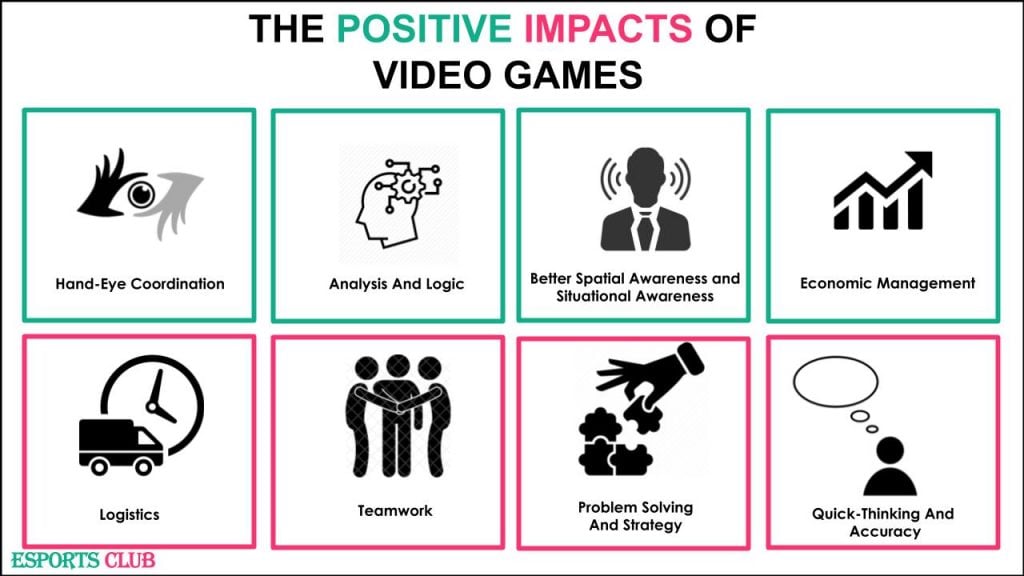Getting the Most Educational Value From Playing Video Games
Written by Paul Richards on January 21, 2020
With new games coming out every month, you may think it could be a near-impossible task for parents and coaches to keep up with the latest video games. Should parents be worried about any potential harmful influences video games can have on their children? How will esports coaches discourage video games with mature and even crude content? This is a question a lot of parents and school administrators ask and their worries are justified.
Given that many games involve graphic scenes of violence and mature content that can include sexual themes, gambling, and drug use, it’s no wonder parents worry. These concerns are often amplified when young people sit for hours playing games that can easily be downloaded from the internet. Luckily, a few concerned individuals and institutions have raised legitimate questions about the physical, mental, and emotional health risks posed by video games. The problem is made more difficult by the fact that most adults are unfamiliar with video gaming culture. Parents of “Millennials” also known as “Generation Y” often voice opinions about being unequipped to decide which video games are helpful or harmful to young people.
There is no straightforward answer to the question “Are video games good or bad?” This is because a lot depends on the game in question. Results can also vary depending on the individual who is playing and the way they interact with the game. However, there are ways for adults and educators to encourage productive gameplay and best practices for selecting appropriate games by age and maturity.
The Trouble with Video Games

Almost everyone has heard of the negative side effects of playing too many video games. There are physical, psychological, and social difficulties that young people who spend too much time playing video games are likely to face. These problems are real and if not properly addressed, they can generate long-term health issues. Against the backdrop of the World Health Organization’s (WHO) declaration of gaming addiction as a mental health disorder, here are some of the most important dangers posed by video games.
Disconnection From Reality
Addicted gamers manifest a significant inability to stay “in the moment” because their minds constantly wander to the game. Additionally, gaming can become an escape from reality. Video games can become a safe haven where the gamer retreats to escape the chaos of life. In some cases, gamers can lose interest in all other non-gaming activities (Holstein, 2019).
Social Isolation
Regardless of how much a video game tries to mimic real life, people still need to physically interact with others to lead a healthy life. Young people may naturally find it hard to make friends, but video games can compound the problem by denying many of today’s youth the chance to outgrow their social awkwardness. The impact of this can be seen in Hong Kong’s problem of “Herbivore Men.” A new article from the South China Morning Post reports that, “In a city already known for its low sex drive, there is a new generation of men who are uninterested in romance and relationships… technology is [reportely] distracting them.” Dr Paul Wong Wai-Chang from University of Hong Kong goes on to say that, “These herbivore men don’t connect with others, they don’t establish their own families or have children and don’t really contribute anything meaningful to society, either tangibly or intangibly” (“Hong Kong’s libido takes another hit, from herbivores and hermits,” 2018).
Physical Health Issues
Lack of exercise is bad for people of any age, but especially for the growing bodies of children and teenagers. The consequences of inadequate exercise include shrinking muscle mass and increased risk of obesity, heart disease, depression, and shorter life expectancy. This is a problem that is being taken seriously in professional esports as the importance of a healthy mind and bodywork hand in hand. New studies do report that sitting all day is just a bad for human health as smoking (“Is Sitting Worse Than Smoking? – Alternet.org,” n.d.).
Brain Damage
Overexposure to computer screens can affect the brain negatively. This is true for TV, computer, or smartphone screens. In some extreme cases, brain damage effects can include seizures, insomnia, and reduced working memory. There is also a higher risk of developing brain diseases, such as schizophrenia, PTSD, and Alzheimer’s. Regulated screen times are critical for young people whose brains are still developing.
Addiction, Aggression, and Attention-Deficit
Video games activate the same centers in the brain that illicit drugs do. Therefore, video games can become addictive. Additionally, many gamers experience increased levels of brain activity that are associated with aggression. Finally, even if video games improve attention, they usually do so in the short-term. Studies show video games can eventually hurt gamers’ long-term attention span (Webber, 2018).

Skills kids can learn from video games
ESRB Rating System and How To Identify The Best Games
The ESRB (Entertainment Software Rating Board) has developed a rating system that parents and other adults can employ to judge the appropriateness of various games for children and young people of different ages. These ratings can be found printed on physical video game boxes and are also displayed on the official video game websites (“Ratings Guide,” n.d.).
The rating uses the following symbols:
- eC (Early Childhood): Equivalent to Soft G and considered safe for young children.
- E (Everyone): Suitable for all ages and equivalent to hard G and soft PG.
- E10+ (Everyone 10+): Appropriate for ages 10 & older, and equivalent to hard PG.
- T (Teen): The game is acceptable for ages 13 and older. This is the equivalent of PG-13.
- M (Mature): Reserved for ages 17 and older. It is equivalent to R.
- AO (Adults Only): Suitable for persons 18+ and equivalent to NC-17.
- RP (Rating Pending): This means the game has not been rated, which is equivalent to NR.
Other than the ESRB system, how can you look for educational value in video games? Asking the following questions can help guide the answers to this question (Editors, 2018).
- Usable Skills: Does the game teach life skills, such as negotiating, analytical thinking, and teamwork? Is the objective of the game related to something that happens in real life?
- Economics: Do players use resources, such as money, time, relationships, and land? Do their choices have an impact on the final outcome of the game?
- Thoughtfulness: Does the game incorporate a repetitive mode that requires only basic memorization or do players have to apply their minds to solve problems?
- Tasking: What is the difficulty level of the game? How challenging is the game? Are their puzzles or activities that require problem-solving?
- Socializing: Games that require team play, cooperation, personal responsibility, as well as, shared objectives, can teach skills that can be transferred into real life.
- Creativity: Does the game spark young peoples’ creativity?
Video Games: A Little More Than Entertainment
Most modern technology is ultimately neither good nor bad. What makes technology useful or unsafe is the way in which it is used. The potential for abuse is real, but the potential for positive use is as well. In reality, so many good uses for video games are being discovered that the importance of proper education and mentorship is imperative. Some of the constructive uses of video games are highly innovative. There are good reasons for high schools, colleges, and even government organizations to put programs in place to foster healthy video gaming. Many of these programs have the ability to put an emphasis on education and learning in a healthy way.
The Positive Impacts of Video Games
Hand-Eye Coordination
Playing video games can help players develop better hand-eye coordination and fine motor skills.
Analysis and Logic
Video games improve players’ level of adeptness for pattern-recognition, analytical thinking, and problem-solving. Gamers can learn to think beyond the immediate facts of a situation, and instead consider the far-reaching implications of their choices (Schrier, 2018).
Better Spatial Awareness and Situational Awareness
In fighting games especially, players have to run, shoot, and keep an eye on enemy positions, all at the same time. Games like this improve spatial skill and situational awareness.
Economic Management
Many multiplayer online game environments have an economic component that is complete with its own currency, virtual goods, and services. This can include economic changes like we see in the real world. In order to win games, players must exhibit economic intelligence to manage multiple economies efficiently. This is a skill that is easily transferred into real life (“10 Ways Multiplayer Gaming Economies Reflect Real World Economy,” 2018).
Logistics
Games such as those that mimic actual city planning and transportation systems have been credited with inspiring many people to pursue a career as a professional urban planner (“Must Reads: From video game today job: How ‘SimCity’ inspired a generation of city planners—Los Angeles Times,” n.d.).
Teamwork
Video games that are team-based improve players’ ability to work cooperatively toward common objectives. Players learn to identify their strengths, build synergies, take responsibility, show initiative and demonstrate leadership. Useful levels of competition and teamwork teach players to pull their own weight within a group (read, 2017).
Problem Solving And Strategy
Video games teach players how to tackle immediate problems while keeping long-term objectives in mind. Instead of reacting impulsively to unfolding situations, players have to think many steps ahead. They not only have to plan their own moves, they must also anticipate and counter what the enemy does (“Playing Video Games Can Boost Fast Thinking,” n.d.).
Quick-Thinking And Accuracy
There are so many variables in gaming environments. Players are expected to make split-second decisions in the midst of rapidly-shifting dynamics. This hones players’ abilities to think on their feet and greatly increases their capacity for quick analyses, fast decision-making, and decisiveness. These are the same abilities that are required by a surgeon (“Video Games Lead to Faster Decisions that are No Less Accurate,” n.d.).
Many More…
These are just the tip of the iceberg when it comes to the benefits that can be derived from playing video games.
Surprising Uses for Video Games in Education and Learning

Positive impacts from video games
The “Gamification” of many industries is a new development that is closely following esports’ push into the mainstream. One of the areas where this new trend is catching on fast is in education. This development is evident across a wide range of industries where people need to be trained for a variety of roles, to help businesses adapt their go-to-market strategies.
Teaching Children With Autism/ADHD
Minecraft has proven particularly effective for calming children with ADHD (“What My Son With ADHD Taught Me About Minecraft and Executive Functioning,” 2016) (Sohn, 2014).
Learning English
A game-based English-as-a-Second-Language (ESL) course found students learned better than by using traditional methods (Baierschmidt, n.d.).
Teaching Statistics
Stanford Graduate School of Education is using a modified version of the video game Space Invaders to improve students’ understanding of statistics (University, Stanford, & California 94305, 2014).
Medical Training
Helping people develop a heightened sensitivity to their surroundings, video games are being used to train surgeons (“Video Games Lead to Faster Decisions that are No Less Accurate,” n.d.).
Combat Readiness
The US military is using video games to improve soldiers’ situational awareness (“Military Video Games Used to Train Troops on the Battlefield,” 2017).
Strategies for Helping Young People Make the Most of Video Games
Finding a balance between the educational aspects in video games and the purely entertainment-driven side can be a challenge. Naturally, parents want to encourage educational experiences for their children. The approach some parents take of demonizing video games and banning kids from playing can be ineffective in most cases. Many parents have found that young people are resentful when parents cannot find common ground to accept video games as an educational or purely entertainment-driven portion of their lives. After reading this book, you should have a better understanding of how important esports already is for many young people around the world. In this section, you will learn productive strategies to help young people get the most educational value out of video games (CNN, n.d.).
As you may imagine, helping young people get educational value from video games can require an involved approach on the part of parents and educators. Unlike traditional sports, many parents today do not understand gaming the way that their children do. Many parents do not share their children’s enthusiasm for esports. Consequently, parents are sometimes unable to serve as a regulating influence in the way young people consume video games. In order to be a positive influence in their children’s’ use of video games, parents must find common ground. It is almost impossible to help a young person manage video games properly without some understanding of the culture surrounding video games (“How to Handle Your Child’s Video Game Obsession Positively,” 2015).
Below are important ways parents and coaches can help young people derive educational value out of the time they spend playing video games.
Why Video Games Are So Alluring
Adults need to understand that video games are so compelling for young people because they tap into a source of wonder and excitement. Most children and teenagers are at a stage in their lives where they are learning how the world works. Children and teens engage in games because they offer a chance to gain mastery over their fears in a safe environment. While parents may think of video games as a waste of time, the gamer views it as an exciting experiential learning process (Olson, 2010).
Some of the key elements of games that make them so compelling include:
Challenge
The chance to confront a seemingly insurmountable situation, think a problem through, and implement a solution is challenging. Gamers experience pride as they accomplish challenging goals. Winning in a video game often translates to a young person exhibiting confidence to tackle real-life problems.
Growth
Learning via video gaming is similar to how humans in a natural setting learn. The lessons taught via video games are often acquired through curiosity, discovery, and participation. Many students find this style of learning more engaging than the traditional lectures they are used to at school. This is why video games are almost never boring. Good video game experiences supply a seemingly endless supply of new information.
Status
Video games, like traditional sports, give young people the chance to gain the respect of their peers. Many gamers develop the feeling of becoming an important member of their tribe. Adults may not understand it, but young people use games to feel more accepted in the world around them.
Risk Within A Controlled Environment
Airline pilots use flight simulators to learn how to fly. Similarly, young people use video games to learn otherwise foriegn concepts. Without flight simulators, becoming a licensed pilot would be a much more life-threatening affair. How would they learn to handle an aircraft in stormy weather?
Fantasy
Our creativity is linked to our imagination. Video games unshackle the mind from the limits of reality and allow us to wander. The creative process begins with the ability to think outside the limits of what is ordinary or accepted. Video games not only enhance the freedom to think, but they also give our imagination structure that lets our brain grasp elusive concepts (S. University, 2013).
Engagement and Exertion
School learning is often a model in passivity. Games provide opportunities for young people to work hard at something that they choose by themselves. They learn to focus, be persistent, and use critical thinking skills during video games. All of this happens while gamers learn to be tolerant of failure. The gaming experience allows gamers the ability to mentally undertake and complete difficult tasks.
Regulating Feelings
Kids often play video games as an outlet for negative emotions. Video games give young people a safe space to be rebellious and mischievous without getting into trouble. Kids use video games to help cope with anger, stress, and loneliness (R & Kulman, 2014). When adults understand young peoples’ gaming habits, they may begin to see things from a different perspective. Adults and educators who carefully study video games can use strategies to help children navigate the world of esports more effectively.
Developing a Video Gaming Management Strategy
In general, video games can be divided into two broad categories:
Educational Video Games
These are video games that are specifically created with education in mind. They include games like Be Trapped and WordSearch Deluxe (word puzzle games), Chicken Invaders 2 (The solar system), Twelve A Dozen (Algebra), Logical Journey of the Zoombinis (Logic), SimCell (Science), and Mighty Math’s Cosmic Geometry (Simple Arithmetic and Geometry). Games developed by these companies – Big Fish Games, Amplify Learning, Broderbund, and Educational Insights – are usually educational.
Non-Educational Video Games with Educational Elements
These are games which, although not designed to teach school subjects like the previous category, can still impart various skills to the players. Examples include management games, which entail raising and managing funds, as well as dealing with business competitors (The Zoo and Simcity), role-playing games that teach map-reading and decision-making (World of Warcraft and Tomb Raider), and strategy games, which offer lessons in real history, experimentation, teamwork, and discovery (Flight Simulator X, Age of Empires, and Empire Earth).
In addition to the above, video games can teach non-cognitive skills, such as patience and discipline, which have a more direct correlation to success in life than IQ. If used properly, games can be a powerful tool for supplementing classroom learning (“Are Video Games Educational?,” n.d.). By and large, the only way to know the educational value of a game is to research it and most importantly, play it. Here is an outline of things parents and educators can do to jumpstart the process of helping young people learn through video games.
Play The Games
This is an absolutely indispensable step to helping kids learn through gaming. Playing games with children is a key way to position adults as an ally in the child’s mind. However, due to the many constraints of adult life, always being available at game-time may not be feasible. Given this, in addition to playing the games online, you can recruit relatives and trusted friends to play with children (“Get Over Yourself and Play Video Games With Your Kid,” n.d.).
Be A Student
Creating a safe space for children to talk about their gameplay is important. Creating common ground where parents and coaches can be spectators during gameplay, can give adults a chance to become a part of their gaming experience, even when they are not actively participating. After all, how many soccer moms actually play soccer? By allowing the child to “school you” in the game, you can learn about it and can regulate their game time more effectively (“8 Reasons Video Games Can Improve Your Child,” n.d.).
Schedule Game Time
The time that kids play a game matter. It is not advisable for children to start off playing video games in the morning. Also, gaming should generally be limited during school days. Some parents report that once children get into game mode, they find it hard to switch back into their school routine. Finally, gaming should be reserved for after activities you want the children to participate in.
Create Gaming Objectives
Many of the video games today can help children learn specific lessons. Game developers have often found fun and exciting ways for gamers to accomplish objectives. Children often focus on the fun part, but adults can help gamers learn more by working to create goals and design plans to reach them.
Take It Beyond Game Time
Many games demand that players do some thinking away from the screen. For example, in Simcity, to lay tracks for a railway needed to expand your city, you must learn how to plan out a city. This can require actual research. Similarly, you need economics to win many of the strategy and multiplayer online battle arena games. Educators can also deliberately seek out ways for students to employ game concepts in the classroom.
Make It Serious Business
Depending on the game being played, the player can journal about their gaming experience. This process would involve documenting objectives, defining a clear strategy, identifying reasons for failures to meet objectives, and new approaches to solving challenges. This introduces structured thinking, planning, and writing into the gaming activity. This can help transform what was previously just a fun activity into a well-thought-out process.
Create Competition
Gaming can often be about competition. Competition often allows players to derive their greatest amount of pride from the activity of gaming. Competing against one another or side-by-side builds relationships. It also provides a platform for teaching, as adults can meld kids’ gaming expertise to their real-world experience, in order to devise a strategy.
Ask Questions
Challenge student thinking by critiquing their game choices. Parents and educators can provide different perspectives on the decisions gamers make. For younger children, you can use questions to encourage problem-solving and further learning. For teenagers, the discussions could serve as touchpoints for discussing real-world problems and educational subjects (Shapiro, n.d.).
More Esports in Education Articles
- Download Esports in Education for free
- Introduction to Esports in Education
- History of video games & esports
- The study of video games
- What are the top esports tournaments?
- College Level Esports Programs
- Apply for the StreamGeeks Esports Scholarship
- How to start an esports club at your school
- How to live stream esports tournaments
- Getting the most educational value out of video games




